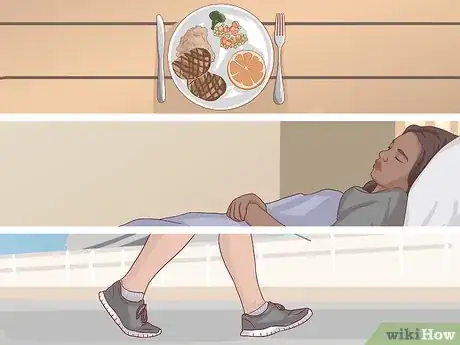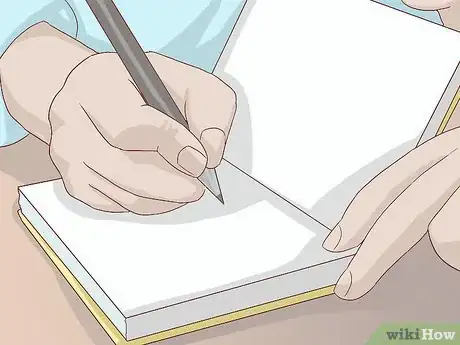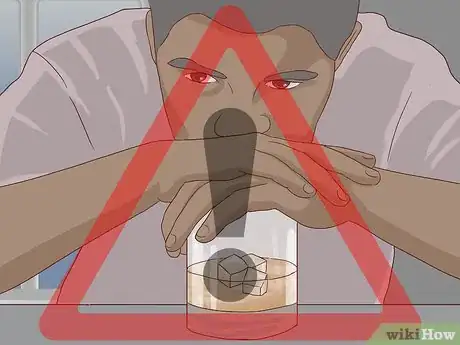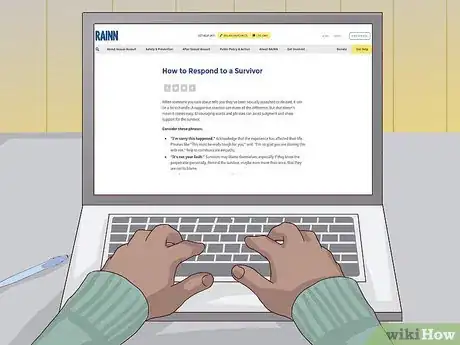This article was co-authored by John A. Lundin, PsyD. John Lundin, Psy. D. is a clinical psychologist with 20 years experience treating mental health issues. Dr. Lundin specializes in treating anxiety and mood issues in people of all ages. He received his Doctorate in Clinical Psychology from the Wright Institute, and he practices in San Francisco and Oakland in California's Bay Area.
There are 15 references cited in this article, which can be found at the bottom of the page.
This article has been viewed 30,052 times.
Sexual assault is a traumatic experience. Recovering from trauma takes time. It goes quicker with support, so rally your loved ones. Ask them to help you through the worst moments. Make dates with the people you love so you can create some good moments as well. Talk to your doctor and follow their recommendations. Get support from the institutions you are affiliated with, such as school or work, especially if you need their help getting distance from the perpetrator. Therapy is essential in emotional recovery, but make sure you get a good therapist who is experienced in helping trauma survivors.
Steps
Taking Care of Yourself
-
1Take care of your physical needs. After a traumatic experience, focus on caring for your body.[1] If you used to have a healthy routine, try returning to that. If you're not sure or if you never had one, try following these guidelines:
- Get enough sleep. If you're an adult, sleep 7-8 hours a night. If you're a teenager, you need closer to 9-11 hours of sleep.[2] Try not to nap during the day, as it can disrupt your night sleep.
- Eat regular meals. Eat at least three meals a day, and include healthy snacks and occasional treats in between your meals. Include fruits, vegetables, whole grains, dairy, protein, and healthy fats in your daily diet.[3]
- Move every day. Exercise, even moderate exercise, is good for your mood and mental health. Try walking, running, biking, or getting some other form of activity in every day of the week.[4]
-
2Re-establish a daily routine. It won't help to have the occasional meal, or get one good night's sleep. Get into the rhythm by going to bed at the same time every night, eating more or less at the same time during the day, and building movement into your routine.[5]
- Try grocery shopping regularly on the weekends so that you always have food in your house. That way you can make sure you have food on hand to make your own meals.
- For instance, you might rise every morning at around 7:00am, eat breakfast, walk to work, go out for lunch with a work friend, take the bus home from work, attend a pilates class in your neighborhood, and start winding down by reading a book an hour before your 11:00pm bedtime.
- Adapt your schedule to suit your needs. If you don't have a workplace, you might schedule a run into your morning routine instead of a walk. If you are a night owl, you might try going to bed by 1am and getting up at 9am.
- Find a schedule you can follow consistently.
Advertisement -
3Return to things you love. Think about a time you felt safe. When you are feeling ungrounded after a traumatic event, it can help to draw up a list of the things that have made you feel safe and good in the past.[6] Think back on the last year or so in which you felt good, and ask yourself:
- What did I like doing for fun? What got me excited?
- Who did I enjoy spending time with? Are there individuals or groups of people with whom I felt safe and happy?
- Where did I like going?
- Integrate these things into your routine. Take trips to places you haven't been in a while. Ask people you love to participate in things you love with you.
- If you need to change anything about these things to enjoy them, do that! For instance, if you were attacked somewhere you felt safe, you might need to re-enter that place gradually, always with friends, or you may need to find a similar space to visit first.
-
4Treat yourself. This doesn't mean spoil yourself—don't spend money or break your patterns in a way that causes anxiety. However, take time every day to give yourself a treat. This might be a warm bath, a walk in a park, a shoulder massage, or a break from work.
- Remind yourself that self-care is your job right now. Taking loving care of yourself, as well as accepting loving care from others, will ease you out of the worst of the trauma.
-
5Practice mindful living. To live mindfully is to pay attention to the present moment, and to accept your thoughts and feelings without judgment. Mindfulness can help you cope with depression, anxiety, and other post-traumatic symptoms.[7]
- If you are having a rough moment, take some deep breaths. Wiggle your toes and fingers, and try focusing on your five senses—what can you hear, smell, see, taste, and touch at this moment?
-
6Guard your media consumption. It's possible to run into images or narratives involving sexual violence online, on TV and on the radio, in the paper, and in your social media. Don't think you have to experience something triggering—if it's painful, you don't have to sit through it. Remind yourself that you are in control: you can close the browser, turn off the volume, or stop reading. If you are exposed to unpleasant material in public, you can turn away, close your eyes, or otherwise refuse to engage. You can unfollow or unfriend someone who posts things that upset you online.[8]
- Remind yourself that you are in control.
- Look out for warnings or clues that material might be triggering, like pictures, ominous language, or blurbs and reviews.
- If you see something upsetting, remind yourself that this isn't the whole story. Movies and other media tend to portray the moment of violence—not the healing process or the life that is lived.
-
7Affirm some basic truths. It can be easy to fall into traps of negative thinking after you have experienced a trauma. Remind yourself: this is not your fault. You are not alone.
- Repeat these statements in the mirror, write them down, or ask loved ones to repeat them to you.
- If a bad thought or feeling comes to you, notice it and accept it without judgment. Don't try to suppress it, but do try to release it. You can give it a name—when the bad feeling comes, say "This is the I'm-worthless-because-someone-treated-me-like-I-don't-matter feeling. I am letting it go."[9]
-
8Be patient. You are in pain now, but you will improve with time. Avoid taking drastic measures. If you're feeling traumatized, you may try to change things that don't need changing, or numb feelings you need to process.
- Keeping a diary can be an excellent way of marking time. Write a little every day before bed, or whenever else you have a free moment. Include the date and time. Write about how you feel, and what you did that day.
- Have check-in sessions with yourself. Several times a day, ask yourself "How do I feel?" Find several adjectives to describe how you feel: mad, glad, sad, bad, anxious, worried, wary, dreamy, distant, raw, gloomy, giddy, etc.
Noticing Potential Problems
-
1Look for signs of PTSD. After experiencing sexual violence, you are likely to feel anxiety, fear, or stress. However, if you are having severe episodes of these feelings, if these feelings interfere with your normal life, or if you experience them for more than a few weeks after the incident, you may be experiencing the symptoms of Post-traumatic Stress Disorder. There are three common symptoms to look out for:[10]
- Re-experiencing: If you feel like you are re-living the event, whether through unwanted thoughts, flashbacks, or dreams, you may have PTSD.
- Avoidance: If you keep away from things you used to enjoy, or if you alter your behavior or routine to avoid things you associate with the traumatic event, you may have PTSD.
- Hyper-arousal: If you feel edgy, nervous, easy to startle, prone to outbursts, or are having trouble sleeping or relaxing, you may have PTSD.
- PTSD requires professional treatment. See a doctor or therapist as soon as you can.
- Cognitive Processing Therapy and Prolonged Exposure are effective therapeutic methods for coping with PTSD.[11]
-
2Recognize the symptoms of depression. You may feel sad, unhappy, hopeless, or disconnected from the things that ordinary bring you pleasure.[12] If these feelings are disrupting your life, seek help. Don't wait—the earlier treatment begins, the more effective it is.[13]
- Helpful kinds of therapy include Cognitive-Behavioral Therapy, Interpersonal Therapy, and problem-solving therapy.[14]
- There are many medications available to help with depression, but seek therapy first.
-
3Learn to weather flashbacks. If you feel yourself plunged into the memory of what happened to you, you are experiencing a flashback. Sometimes it feels like you are experiencing the event all over again, or like the perpetrator is actually there. Flashbacks can make it hard to stay connected to reality. They can be triggered by sensory reminders, like smells or a tone of voice. Learn the signs of an impending flashback so that you can recognize them when you have them, and get yourself back to reality.[15]
- To get through a flashback, tell yourself you are having a flashback.
- Say to yourself, "the event is over. I survived it."
- Put a hand on your stomach and take slow deep breaths. Pay attention to your stomach as it rises and falls.
- Pay attention to your senses: what do you smell, hear, taste, and feel?
- Find something that would make you feel safer, like sitting in a soft chair, going outside, or spending some time with a loved one.
- Talk to a therapist about flashbacks, especially if they worsen over time. They can be sign of PTSD.
-
4Check yourself for harmful coping methods. Surviving trauma means you may be at a risk for self-harm, disordered eating, and substance abuse.[16] You may turn to these coping methods to help you survive an emotionally painful moment. However, they can lead to serious health risks and can increase the risk of further trauma.
- Seek balance. Ask your friends and family to eat meals with you.
- If substances are becoming a problem, abstain for a while. Find daytime activities that don't involve alcohol or drugs.
- Seek help from your doctor or counselor if you are engaging in dangerous behaviors or having troubling thoughts.
-
5Get immediate help for suicidal thoughts. If you are thinking about hurting or killing yourself, seek immediate help.[17] You can call a counselor, your doctor, emergency services, or a suicide prevention hotline (in the United States, this can be done by calling or texting 988).
- Tell your loved ones what you are experiencing, and ask them to stay with you while you try to get through the feeling.
- Your loved one may want to call for help. Let them, but ask them to stay with you while help arrives or while you talk on the phone.
Getting the Help You Need
-
1See a therapist. Find a good therapist you like. A therapist who is experienced in survivor counseling is best. When you find a therapist you like, you can discuss a timeline and a method of treatment. You may want to go to your therapist indefinitely, or you may feel best going for a few months only.[18]
- If you are in the United States, you can locate a specialist using the APA locator: http://locator.apa.org/
- Talk to your therapist on the phone, or ask for a preliminary session to see if you feel comfortable with them.
-
2Open up to your network. Get the people in your life to support you during this difficult time. Talking to people you love about what happened is an important part of emotional recovery. Choose to confide in people who take what you say seriously—if someone tries to blow off what you say, talk to somebody else.
- Look to serious-minded, caring friends, or friends who have experience in helping others recover.
- Put your trust in your close friends and family. After trauma, it can be hard to trust other people, but doing so will help you recover.
- If your loved ones react badly at first, take some space and find other help. Give them a chance to educate themselves instead of giving up on them permanently—they may come to understand the situation better later, and regret their initial response.
-
3Ask your loved ones to educate themselves. If your family and friends are having trouble processing what happened to you, refer them to useful sources, like RAINN's How to Respond to a Survivor: https://www.rainn.org/articles/how-respond-survivor
- Ask them to read up on ways to help you through this time.
- It may help your loved ones to learn some basic facts about rape: https://www.rainn.org/statistics
- Tell them what you need from them, and explain why you need it. You might say: "I appreciate your concern, but I need you to not bring up what happened out of nowhere. I want to talk to you about it, but I can only do that when I feel ready. If I bring it up, we can talk, ok?"
-
4Get distance from the perpetrator. You should not be forced to spend time with the perpetrator. If you are in communication with them, tell them to leave you completely alone and not to contact you at all. In the majority of cases, they will be someone you know. If they are a family member, friend, classmate, community member, or coworker, you may need to ask others for help in keeping your distance.
- If you feel capable, report the assault to the police. You may wish to get a restraining order to keep the perpetrator far from you.
- Report assault by a classmate to your college, and tell your friends and your Residential Life counselor.
- Report assault by a coworker to your supervisor and to HR, and ask to either work from home or have the perpetrator work from home while the situation is investigated.
- If you live with the perpetrator, try to get them out of the house. If you can't get them out, find a place to stay while you continue to get them out.
- Talk to leaders and other members of your community about assault that occurs within the community. Ask them to keep the perpetrator out. You shouldn't have to avoid events due to someone else's violence.
Expert Q&A
-
QuestionDo sexual assault survivors need therapy?
 John A. Lundin, PsyDJohn Lundin, Psy. D. is a clinical psychologist with 20 years experience treating mental health issues. Dr. Lundin specializes in treating anxiety and mood issues in people of all ages. He received his Doctorate in Clinical Psychology from the Wright Institute, and he practices in San Francisco and Oakland in California's Bay Area.
John A. Lundin, PsyDJohn Lundin, Psy. D. is a clinical psychologist with 20 years experience treating mental health issues. Dr. Lundin specializes in treating anxiety and mood issues in people of all ages. He received his Doctorate in Clinical Psychology from the Wright Institute, and he practices in San Francisco and Oakland in California's Bay Area.
Clinical Psychologist Yes, your recovery will be easier if you work with a therapist. If you've been raped, it's vital to seek treatment from a qualified professional.
Yes, your recovery will be easier if you work with a therapist. If you've been raped, it's vital to seek treatment from a qualified professional.
Warnings
- If you ever have thoughts of suicide, don't do anything to hurt yourself. You have been hurt, but everyone's important. Call the Emergency Services or your country's suicide prevention hotline, which, for example, is 988 in the United States (you can also text this number).⧼thumbs_response⧽
References
- ↑ https://www.rainn.org/articles/self-care-after-trauma
- ↑ http://www.mayoclinic.org/healthy-lifestyle/adult-health/expert-answers/how-many-hours-of-sleep-are-enough/faq-20057898
- ↑ http://www.mayoclinic.org/healthy-lifestyle/nutrition-and-healthy-eating/basics/healthy-diets/hlv-20049477
- ↑ http://www.mayoclinic.org/healthy-lifestyle/fitness/in-depth/exercise/art-20048389?pg=1
- ↑ https://www.rainn.org/articles/self-care-after-trauma
- ↑ https://www.rainn.org/articles/self-care-after-trauma
- ↑ http://www.mayoclinic.org/healthy-lifestyle/consumer-health/in-depth/mindfulness-exercises/art-20046356?pg=1
- ↑ https://www.rainn.org/articles/tips-survivors-consuming-media
- ↑ http://www.mayoclinic.org/healthy-lifestyle/adult-health/in-depth/self-esteem/art-20045374
- ↑ https://www.rainn.org/articles/post-traumatic-stress-disorder
- ↑ http://www.ptsd.va.gov/public/treatment/therapy-med/mindful-ptsd.asp
- ↑ https://www.rainn.org/articles/depression
- ↑ http://www.nimh.nih.gov/health/topics/depression/index.shtml
- ↑ http://www.nimh.nih.gov/health/topics/depression/index.shtml
- ↑ https://www.rainn.org/articles/flashbacks
- ↑ https://www.rainn.org/effects-sexual-violence
- ↑ http://www.ptsd.va.gov/public/problems/common-reactions-after-trauma.asp
- ↑ https://www.rainn.org/articles/how-can-therapy-help
About This Article
Recovering emotionally after a traumatic experience like rape can take time, but taking care of yourself can help you begin to move forward. After a traumatic experience, it’s important to take care of your body by getting enough sleep, eating regular meals, and moving every day. Returning to things you love, like painting, running, or writing, can also help you feel more grounded. In addition to meeting your basic needs, take time every day to give yourself a treat, like a warm bath or a walk in the park, to give yourself some space and love. You may also want to seek the help of a therapist who is trained in survivor counseling. While you may be in pain now, things will improve with time. To learn how to open up to your friends and family about your assault, keep reading.













































































